Impact of Social Media Marketing on Sales Promotion in Sri Lanka
VerifiedAdded on 2023/01/10
|57
|16182
|24
Thesis and Dissertation
AI Summary
This MBA dissertation draft investigates the impact of social media marketing on sales promotion within the hospitality industry in Sri Lanka. The study's objectives include examining sales promotion campaigns, identifying influencing factors, and suggesting strategies to enhance effectiveness while addressing industry challenges. The research utilizes a literature review, a deductive approach, quantitative research methods, and data analysis techniques like frequency distribution analysis and regression analysis. The findings are discussed in relation to the literature, and the dissertation concludes with recommendations and suggestions for future research, providing valuable insights into the role of social media in driving sales and growth within the Sri Lankan hospitality sector. The dissertation covers various aspects, including the background of the hospitality industry in Sri Lanka, research objectives, research questions, rationale, research gap, and structure of the dissertation, followed by the literature review, research methodology, presentation of findings, discussion of findings, and conclusions and recommendations.
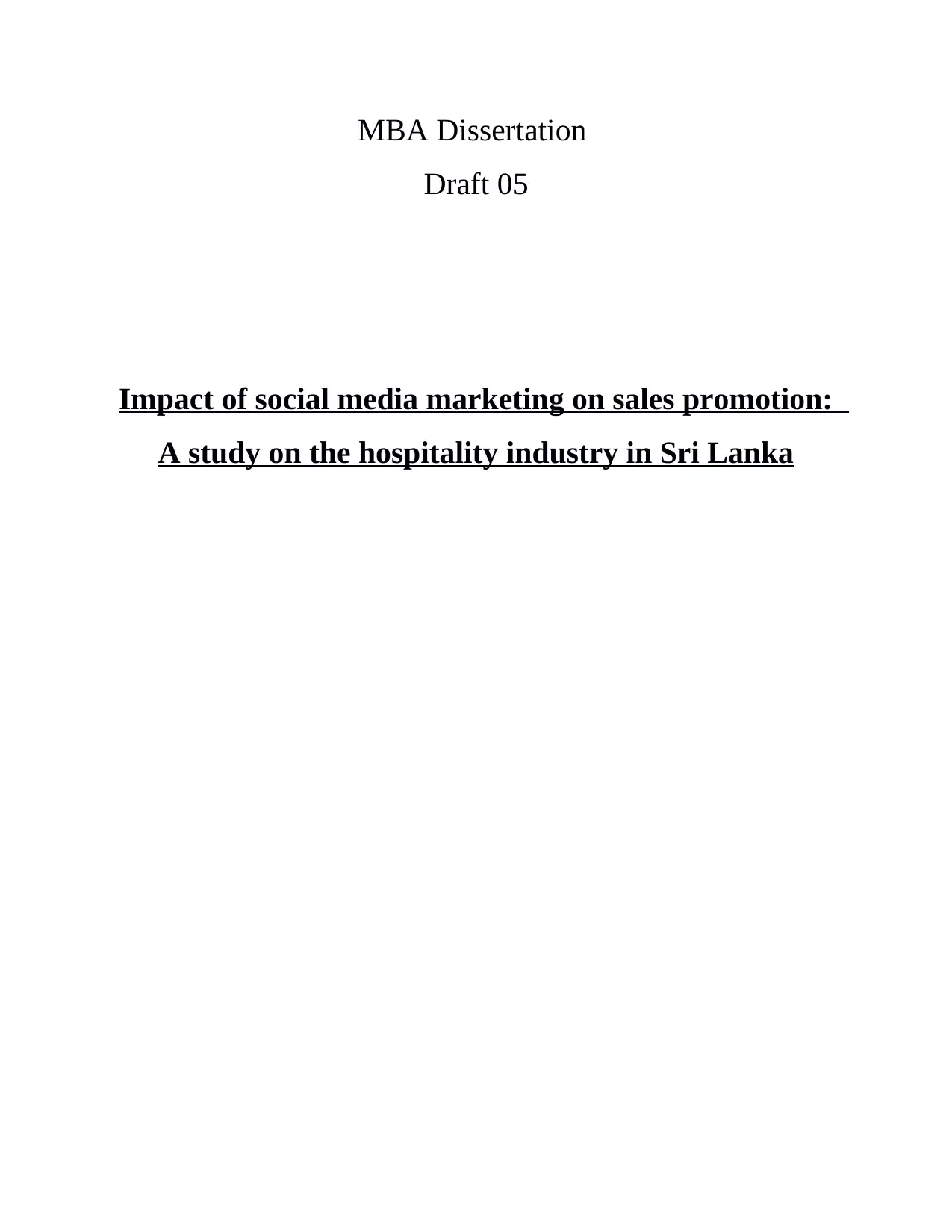
MBA Dissertation
Draft 05
Impact of social media marketing on sales promotion:
A study on the hospitality industry in Sri Lanka
Draft 05
Impact of social media marketing on sales promotion:
A study on the hospitality industry in Sri Lanka
Paraphrase This Document
Need a fresh take? Get an instant paraphrase of this document with our AI Paraphraser
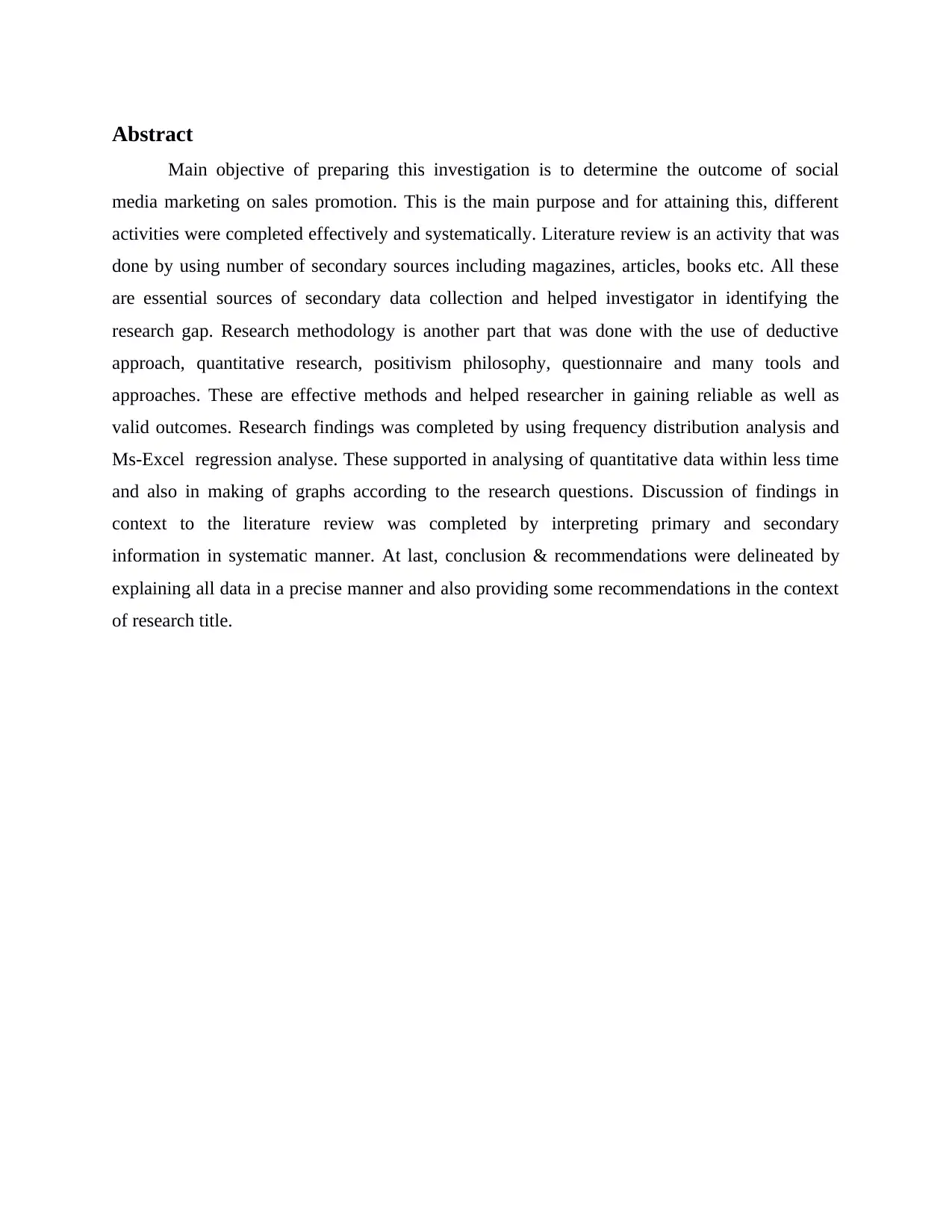
Abstract
Main objective of preparing this investigation is to determine the outcome of social
media marketing on sales promotion. This is the main purpose and for attaining this, different
activities were completed effectively and systematically. Literature review is an activity that was
done by using number of secondary sources including magazines, articles, books etc. All these
are essential sources of secondary data collection and helped investigator in identifying the
research gap. Research methodology is another part that was done with the use of deductive
approach, quantitative research, positivism philosophy, questionnaire and many tools and
approaches. These are effective methods and helped researcher in gaining reliable as well as
valid outcomes. Research findings was completed by using frequency distribution analysis and
Ms-Excel regression analyse. These supported in analysing of quantitative data within less time
and also in making of graphs according to the research questions. Discussion of findings in
context to the literature review was completed by interpreting primary and secondary
information in systematic manner. At last, conclusion & recommendations were delineated by
explaining all data in a precise manner and also providing some recommendations in the context
of research title.
Main objective of preparing this investigation is to determine the outcome of social
media marketing on sales promotion. This is the main purpose and for attaining this, different
activities were completed effectively and systematically. Literature review is an activity that was
done by using number of secondary sources including magazines, articles, books etc. All these
are essential sources of secondary data collection and helped investigator in identifying the
research gap. Research methodology is another part that was done with the use of deductive
approach, quantitative research, positivism philosophy, questionnaire and many tools and
approaches. These are effective methods and helped researcher in gaining reliable as well as
valid outcomes. Research findings was completed by using frequency distribution analysis and
Ms-Excel regression analyse. These supported in analysing of quantitative data within less time
and also in making of graphs according to the research questions. Discussion of findings in
context to the literature review was completed by interpreting primary and secondary
information in systematic manner. At last, conclusion & recommendations were delineated by
explaining all data in a precise manner and also providing some recommendations in the context
of research title.
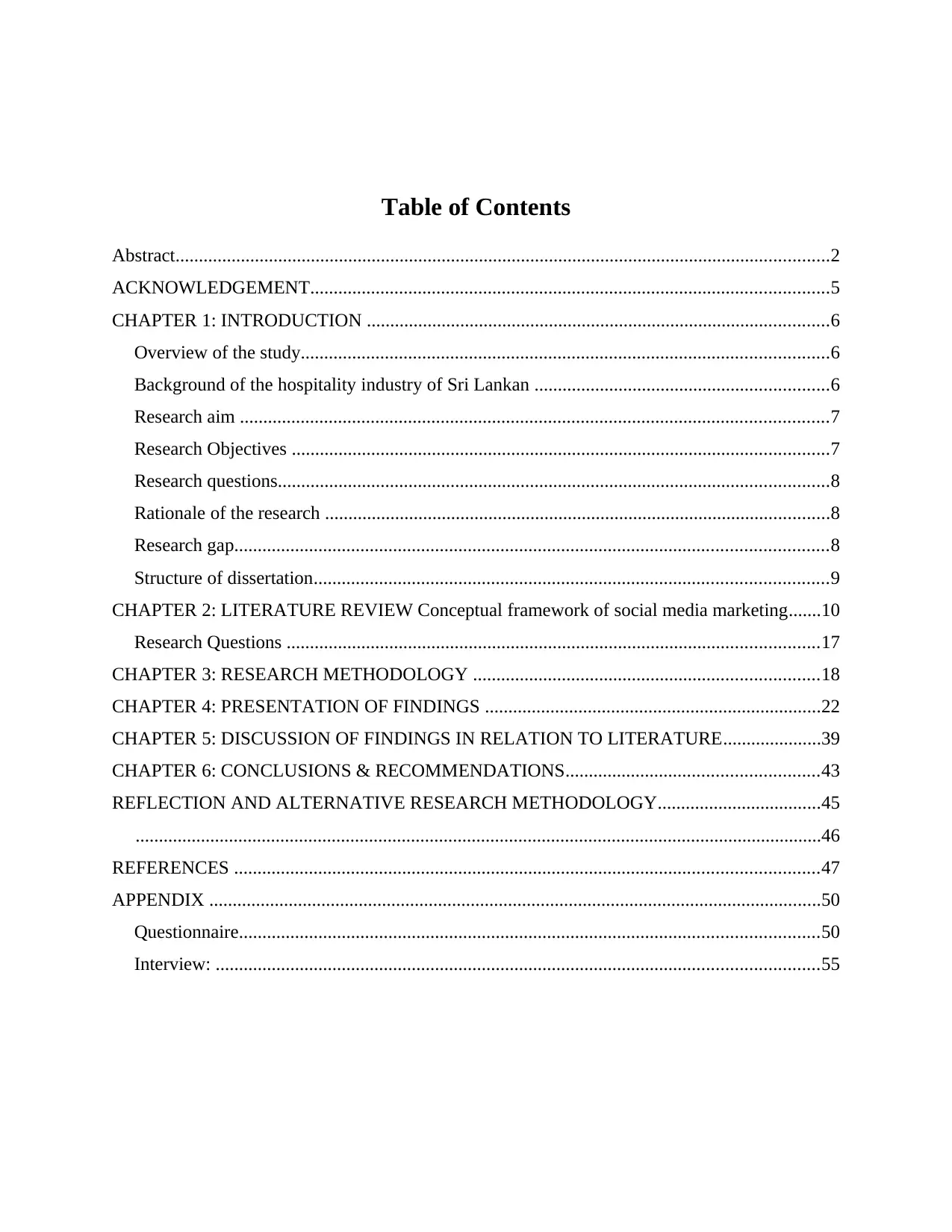
Table of Contents
Abstract............................................................................................................................................2
ACKNOWLEDGEMENT...............................................................................................................5
CHAPTER 1: INTRODUCTION ...................................................................................................6
Overview of the study.................................................................................................................6
Background of the hospitality industry of Sri Lankan ...............................................................6
Research aim ..............................................................................................................................7
Research Objectives ...................................................................................................................7
Research questions......................................................................................................................8
Rationale of the research ............................................................................................................8
Research gap...............................................................................................................................8
Structure of dissertation..............................................................................................................9
CHAPTER 2: LITERATURE REVIEW Conceptual framework of social media marketing.......10
Research Questions ..................................................................................................................17
CHAPTER 3: RESEARCH METHODOLOGY ..........................................................................18
CHAPTER 4: PRESENTATION OF FINDINGS ........................................................................22
CHAPTER 5: DISCUSSION OF FINDINGS IN RELATION TO LITERATURE.....................39
CHAPTER 6: CONCLUSIONS & RECOMMENDATIONS......................................................43
REFLECTION AND ALTERNATIVE RESEARCH METHODOLOGY...................................45
...................................................................................................................................................46
REFERENCES .............................................................................................................................47
APPENDIX ...................................................................................................................................50
Questionnaire............................................................................................................................50
Interview: .................................................................................................................................55
Abstract............................................................................................................................................2
ACKNOWLEDGEMENT...............................................................................................................5
CHAPTER 1: INTRODUCTION ...................................................................................................6
Overview of the study.................................................................................................................6
Background of the hospitality industry of Sri Lankan ...............................................................6
Research aim ..............................................................................................................................7
Research Objectives ...................................................................................................................7
Research questions......................................................................................................................8
Rationale of the research ............................................................................................................8
Research gap...............................................................................................................................8
Structure of dissertation..............................................................................................................9
CHAPTER 2: LITERATURE REVIEW Conceptual framework of social media marketing.......10
Research Questions ..................................................................................................................17
CHAPTER 3: RESEARCH METHODOLOGY ..........................................................................18
CHAPTER 4: PRESENTATION OF FINDINGS ........................................................................22
CHAPTER 5: DISCUSSION OF FINDINGS IN RELATION TO LITERATURE.....................39
CHAPTER 6: CONCLUSIONS & RECOMMENDATIONS......................................................43
REFLECTION AND ALTERNATIVE RESEARCH METHODOLOGY...................................45
...................................................................................................................................................46
REFERENCES .............................................................................................................................47
APPENDIX ...................................................................................................................................50
Questionnaire............................................................................................................................50
Interview: .................................................................................................................................55
⊘ This is a preview!⊘
Do you want full access?
Subscribe today to unlock all pages.

Trusted by 1+ million students worldwide

Paraphrase This Document
Need a fresh take? Get an instant paraphrase of this document with our AI Paraphraser
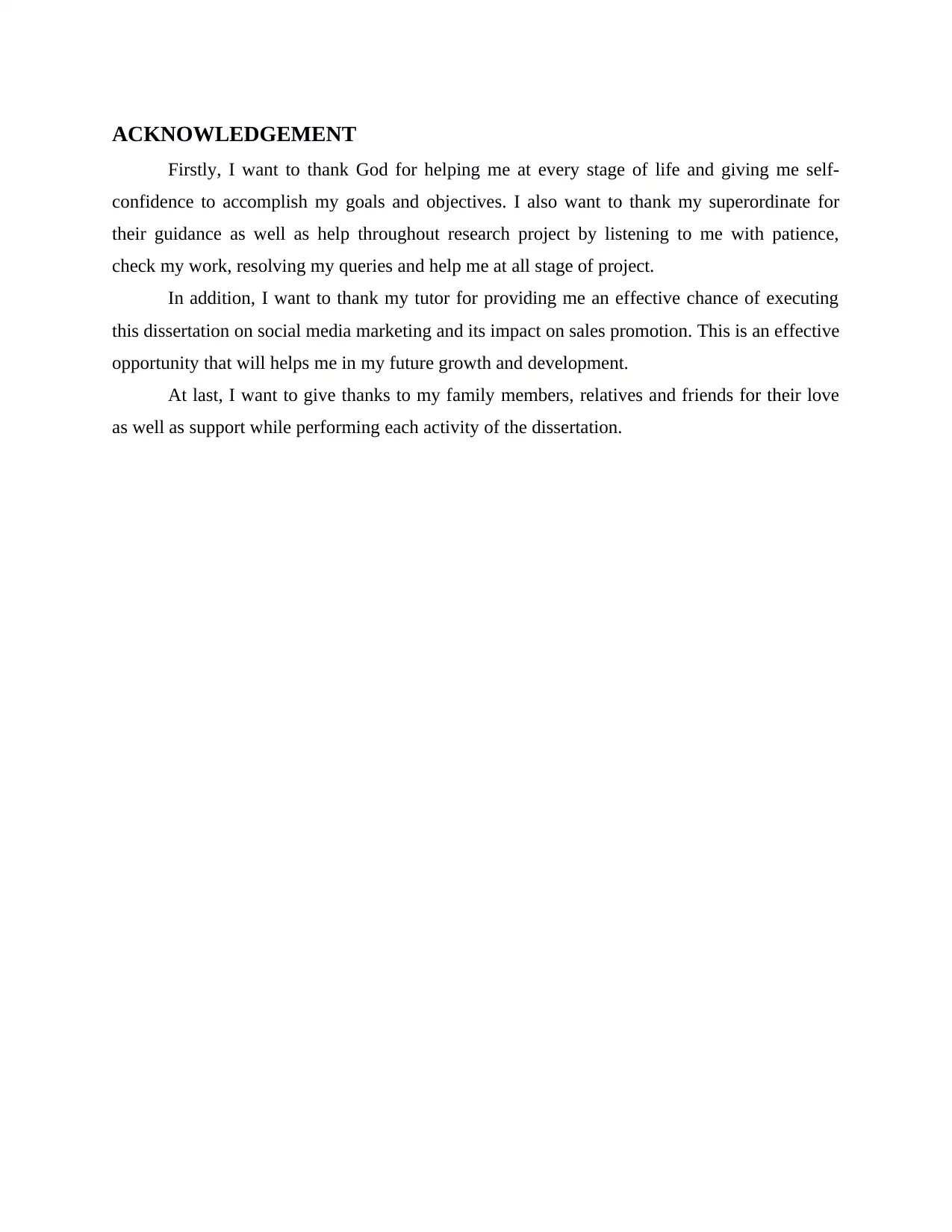
ACKNOWLEDGEMENT
Firstly, I want to thank God for helping me at every stage of life and giving me self-
confidence to accomplish my goals and objectives. I also want to thank my superordinate for
their guidance as well as help throughout research project by listening to me with patience,
check my work, resolving my queries and help me at all stage of project.
In addition, I want to thank my tutor for providing me an effective chance of executing
this dissertation on social media marketing and its impact on sales promotion. This is an effective
opportunity that will helps me in my future growth and development.
At last, I want to give thanks to my family members, relatives and friends for their love
as well as support while performing each activity of the dissertation.
Firstly, I want to thank God for helping me at every stage of life and giving me self-
confidence to accomplish my goals and objectives. I also want to thank my superordinate for
their guidance as well as help throughout research project by listening to me with patience,
check my work, resolving my queries and help me at all stage of project.
In addition, I want to thank my tutor for providing me an effective chance of executing
this dissertation on social media marketing and its impact on sales promotion. This is an effective
opportunity that will helps me in my future growth and development.
At last, I want to give thanks to my family members, relatives and friends for their love
as well as support while performing each activity of the dissertation.
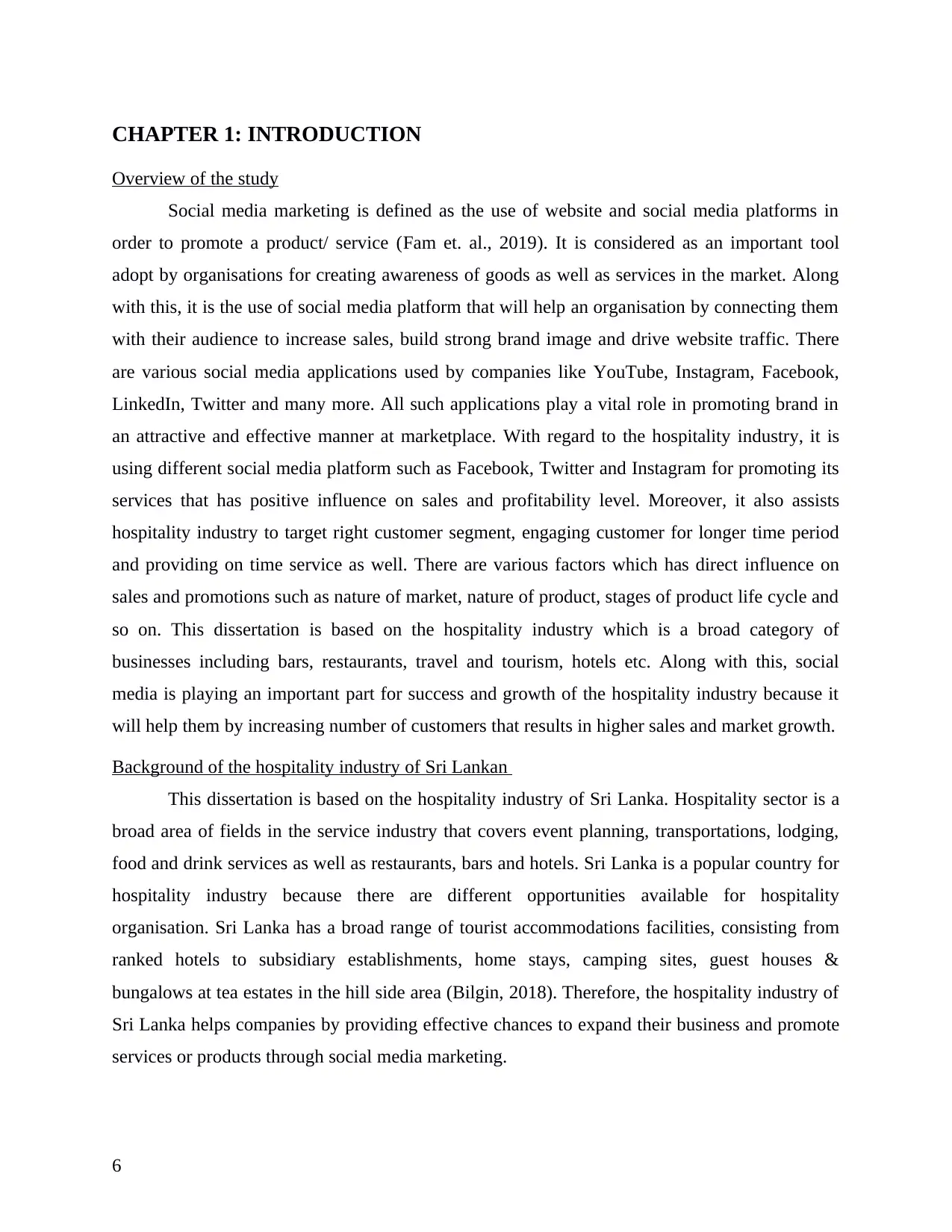
CHAPTER 1: INTRODUCTION
Overview of the study
Social media marketing is defined as the use of website and social media platforms in
order to promote a product/ service (Fam et. al., 2019). It is considered as an important tool
adopt by organisations for creating awareness of goods as well as services in the market. Along
with this, it is the use of social media platform that will help an organisation by connecting them
with their audience to increase sales, build strong brand image and drive website traffic. There
are various social media applications used by companies like YouTube, Instagram, Facebook,
LinkedIn, Twitter and many more. All such applications play a vital role in promoting brand in
an attractive and effective manner at marketplace. With regard to the hospitality industry, it is
using different social media platform such as Facebook, Twitter and Instagram for promoting its
services that has positive influence on sales and profitability level. Moreover, it also assists
hospitality industry to target right customer segment, engaging customer for longer time period
and providing on time service as well. There are various factors which has direct influence on
sales and promotions such as nature of market, nature of product, stages of product life cycle and
so on. This dissertation is based on the hospitality industry which is a broad category of
businesses including bars, restaurants, travel and tourism, hotels etc. Along with this, social
media is playing an important part for success and growth of the hospitality industry because it
will help them by increasing number of customers that results in higher sales and market growth.
Background of the hospitality industry of Sri Lankan
This dissertation is based on the hospitality industry of Sri Lanka. Hospitality sector is a
broad area of fields in the service industry that covers event planning, transportations, lodging,
food and drink services as well as restaurants, bars and hotels. Sri Lanka is a popular country for
hospitality industry because there are different opportunities available for hospitality
organisation. Sri Lanka has a broad range of tourist accommodations facilities, consisting from
ranked hotels to subsidiary establishments, home stays, camping sites, guest houses &
bungalows at tea estates in the hill side area (Bilgin, 2018). Therefore, the hospitality industry of
Sri Lanka helps companies by providing effective chances to expand their business and promote
services or products through social media marketing.
6
Overview of the study
Social media marketing is defined as the use of website and social media platforms in
order to promote a product/ service (Fam et. al., 2019). It is considered as an important tool
adopt by organisations for creating awareness of goods as well as services in the market. Along
with this, it is the use of social media platform that will help an organisation by connecting them
with their audience to increase sales, build strong brand image and drive website traffic. There
are various social media applications used by companies like YouTube, Instagram, Facebook,
LinkedIn, Twitter and many more. All such applications play a vital role in promoting brand in
an attractive and effective manner at marketplace. With regard to the hospitality industry, it is
using different social media platform such as Facebook, Twitter and Instagram for promoting its
services that has positive influence on sales and profitability level. Moreover, it also assists
hospitality industry to target right customer segment, engaging customer for longer time period
and providing on time service as well. There are various factors which has direct influence on
sales and promotions such as nature of market, nature of product, stages of product life cycle and
so on. This dissertation is based on the hospitality industry which is a broad category of
businesses including bars, restaurants, travel and tourism, hotels etc. Along with this, social
media is playing an important part for success and growth of the hospitality industry because it
will help them by increasing number of customers that results in higher sales and market growth.
Background of the hospitality industry of Sri Lankan
This dissertation is based on the hospitality industry of Sri Lanka. Hospitality sector is a
broad area of fields in the service industry that covers event planning, transportations, lodging,
food and drink services as well as restaurants, bars and hotels. Sri Lanka is a popular country for
hospitality industry because there are different opportunities available for hospitality
organisation. Sri Lanka has a broad range of tourist accommodations facilities, consisting from
ranked hotels to subsidiary establishments, home stays, camping sites, guest houses &
bungalows at tea estates in the hill side area (Bilgin, 2018). Therefore, the hospitality industry of
Sri Lanka helps companies by providing effective chances to expand their business and promote
services or products through social media marketing.
6
⊘ This is a preview!⊘
Do you want full access?
Subscribe today to unlock all pages.

Trusted by 1+ million students worldwide
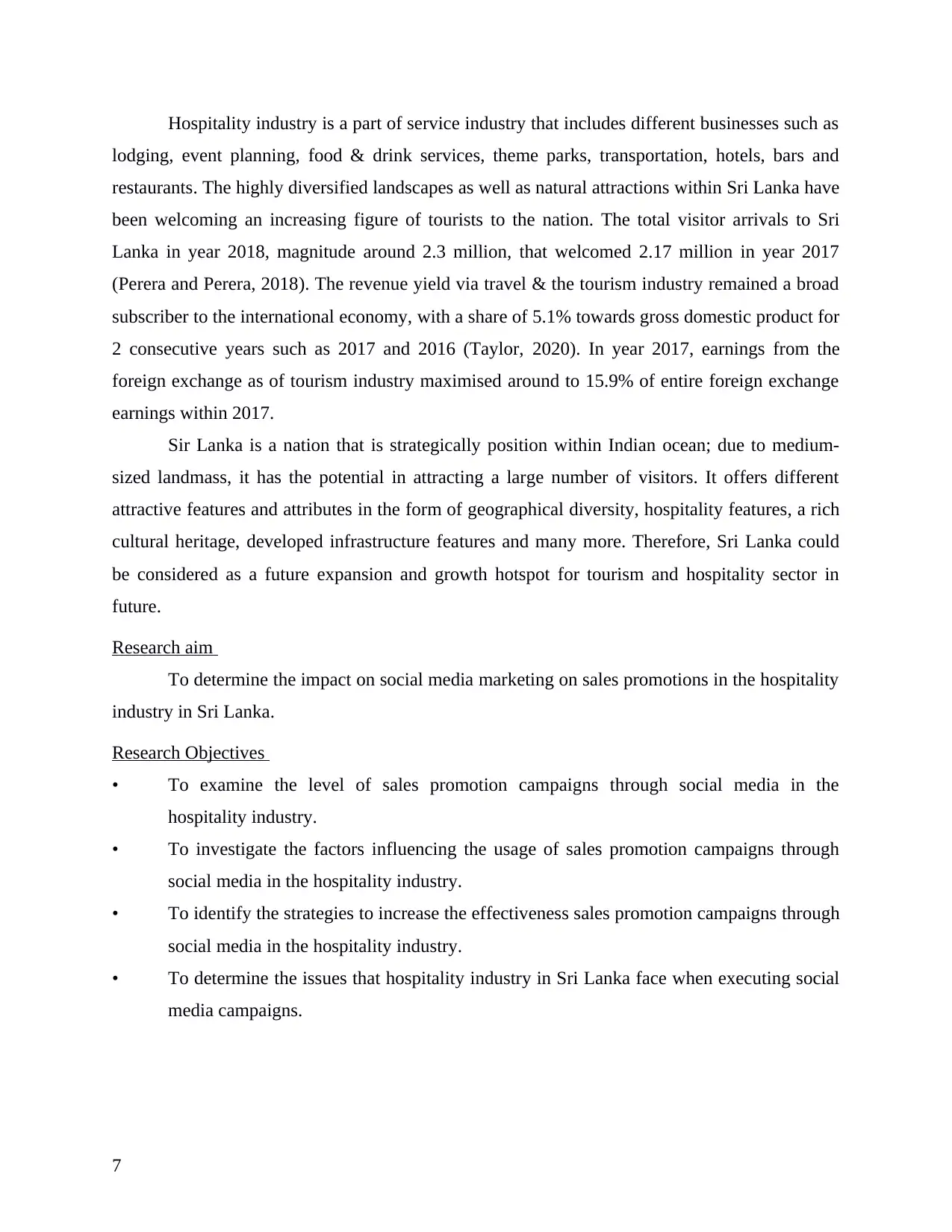
Hospitality industry is a part of service industry that includes different businesses such as
lodging, event planning, food & drink services, theme parks, transportation, hotels, bars and
restaurants. The highly diversified landscapes as well as natural attractions within Sri Lanka have
been welcoming an increasing figure of tourists to the nation. The total visitor arrivals to Sri
Lanka in year 2018, magnitude around 2.3 million, that welcomed 2.17 million in year 2017
(Perera and Perera, 2018). The revenue yield via travel & the tourism industry remained a broad
subscriber to the international economy, with a share of 5.1% towards gross domestic product for
2 consecutive years such as 2017 and 2016 (Taylor, 2020). In year 2017, earnings from the
foreign exchange as of tourism industry maximised around to 15.9% of entire foreign exchange
earnings within 2017.
Sir Lanka is a nation that is strategically position within Indian ocean; due to medium-
sized landmass, it has the potential in attracting a large number of visitors. It offers different
attractive features and attributes in the form of geographical diversity, hospitality features, a rich
cultural heritage, developed infrastructure features and many more. Therefore, Sri Lanka could
be considered as a future expansion and growth hotspot for tourism and hospitality sector in
future.
Research aim
To determine the impact on social media marketing on sales promotions in the hospitality
industry in Sri Lanka.
Research Objectives
• To examine the level of sales promotion campaigns through social media in the
hospitality industry.
• To investigate the factors influencing the usage of sales promotion campaigns through
social media in the hospitality industry.
• To identify the strategies to increase the effectiveness sales promotion campaigns through
social media in the hospitality industry.
• To determine the issues that hospitality industry in Sri Lanka face when executing social
media campaigns.
7
lodging, event planning, food & drink services, theme parks, transportation, hotels, bars and
restaurants. The highly diversified landscapes as well as natural attractions within Sri Lanka have
been welcoming an increasing figure of tourists to the nation. The total visitor arrivals to Sri
Lanka in year 2018, magnitude around 2.3 million, that welcomed 2.17 million in year 2017
(Perera and Perera, 2018). The revenue yield via travel & the tourism industry remained a broad
subscriber to the international economy, with a share of 5.1% towards gross domestic product for
2 consecutive years such as 2017 and 2016 (Taylor, 2020). In year 2017, earnings from the
foreign exchange as of tourism industry maximised around to 15.9% of entire foreign exchange
earnings within 2017.
Sir Lanka is a nation that is strategically position within Indian ocean; due to medium-
sized landmass, it has the potential in attracting a large number of visitors. It offers different
attractive features and attributes in the form of geographical diversity, hospitality features, a rich
cultural heritage, developed infrastructure features and many more. Therefore, Sri Lanka could
be considered as a future expansion and growth hotspot for tourism and hospitality sector in
future.
Research aim
To determine the impact on social media marketing on sales promotions in the hospitality
industry in Sri Lanka.
Research Objectives
• To examine the level of sales promotion campaigns through social media in the
hospitality industry.
• To investigate the factors influencing the usage of sales promotion campaigns through
social media in the hospitality industry.
• To identify the strategies to increase the effectiveness sales promotion campaigns through
social media in the hospitality industry.
• To determine the issues that hospitality industry in Sri Lanka face when executing social
media campaigns.
7
Paraphrase This Document
Need a fresh take? Get an instant paraphrase of this document with our AI Paraphraser
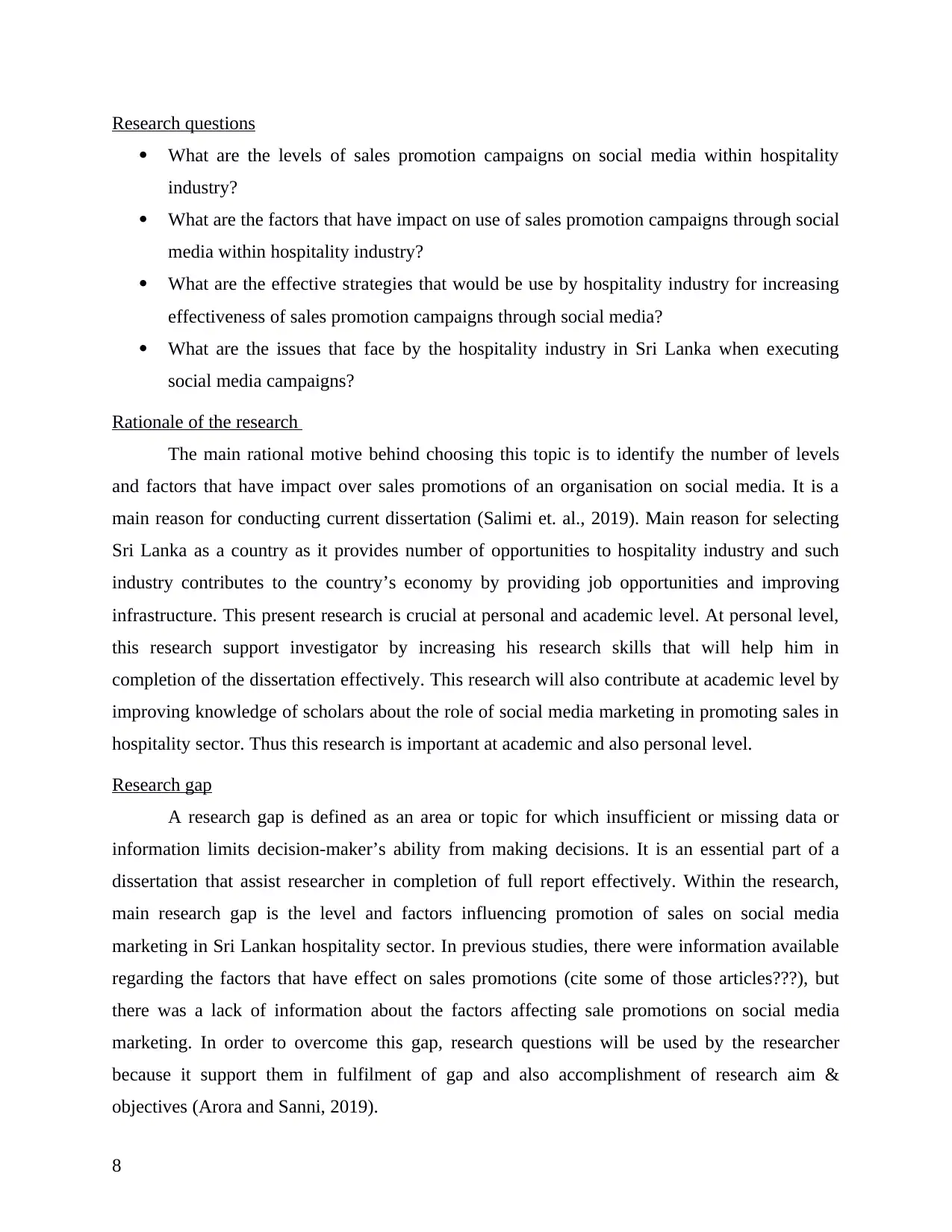
Research questions
What are the levels of sales promotion campaigns on social media within hospitality
industry?
What are the factors that have impact on use of sales promotion campaigns through social
media within hospitality industry?
What are the effective strategies that would be use by hospitality industry for increasing
effectiveness of sales promotion campaigns through social media?
What are the issues that face by the hospitality industry in Sri Lanka when executing
social media campaigns?
Rationale of the research
The main rational motive behind choosing this topic is to identify the number of levels
and factors that have impact over sales promotions of an organisation on social media. It is a
main reason for conducting current dissertation (Salimi et. al., 2019). Main reason for selecting
Sri Lanka as a country as it provides number of opportunities to hospitality industry and such
industry contributes to the country’s economy by providing job opportunities and improving
infrastructure. This present research is crucial at personal and academic level. At personal level,
this research support investigator by increasing his research skills that will help him in
completion of the dissertation effectively. This research will also contribute at academic level by
improving knowledge of scholars about the role of social media marketing in promoting sales in
hospitality sector. Thus this research is important at academic and also personal level.
Research gap
A research gap is defined as an area or topic for which insufficient or missing data or
information limits decision-maker’s ability from making decisions. It is an essential part of a
dissertation that assist researcher in completion of full report effectively. Within the research,
main research gap is the level and factors influencing promotion of sales on social media
marketing in Sri Lankan hospitality sector. In previous studies, there were information available
regarding the factors that have effect on sales promotions (cite some of those articles???), but
there was a lack of information about the factors affecting sale promotions on social media
marketing. In order to overcome this gap, research questions will be used by the researcher
because it support them in fulfilment of gap and also accomplishment of research aim &
objectives (Arora and Sanni, 2019).
8
What are the levels of sales promotion campaigns on social media within hospitality
industry?
What are the factors that have impact on use of sales promotion campaigns through social
media within hospitality industry?
What are the effective strategies that would be use by hospitality industry for increasing
effectiveness of sales promotion campaigns through social media?
What are the issues that face by the hospitality industry in Sri Lanka when executing
social media campaigns?
Rationale of the research
The main rational motive behind choosing this topic is to identify the number of levels
and factors that have impact over sales promotions of an organisation on social media. It is a
main reason for conducting current dissertation (Salimi et. al., 2019). Main reason for selecting
Sri Lanka as a country as it provides number of opportunities to hospitality industry and such
industry contributes to the country’s economy by providing job opportunities and improving
infrastructure. This present research is crucial at personal and academic level. At personal level,
this research support investigator by increasing his research skills that will help him in
completion of the dissertation effectively. This research will also contribute at academic level by
improving knowledge of scholars about the role of social media marketing in promoting sales in
hospitality sector. Thus this research is important at academic and also personal level.
Research gap
A research gap is defined as an area or topic for which insufficient or missing data or
information limits decision-maker’s ability from making decisions. It is an essential part of a
dissertation that assist researcher in completion of full report effectively. Within the research,
main research gap is the level and factors influencing promotion of sales on social media
marketing in Sri Lankan hospitality sector. In previous studies, there were information available
regarding the factors that have effect on sales promotions (cite some of those articles???), but
there was a lack of information about the factors affecting sale promotions on social media
marketing. In order to overcome this gap, research questions will be used by the researcher
because it support them in fulfilment of gap and also accomplishment of research aim &
objectives (Arora and Sanni, 2019).
8
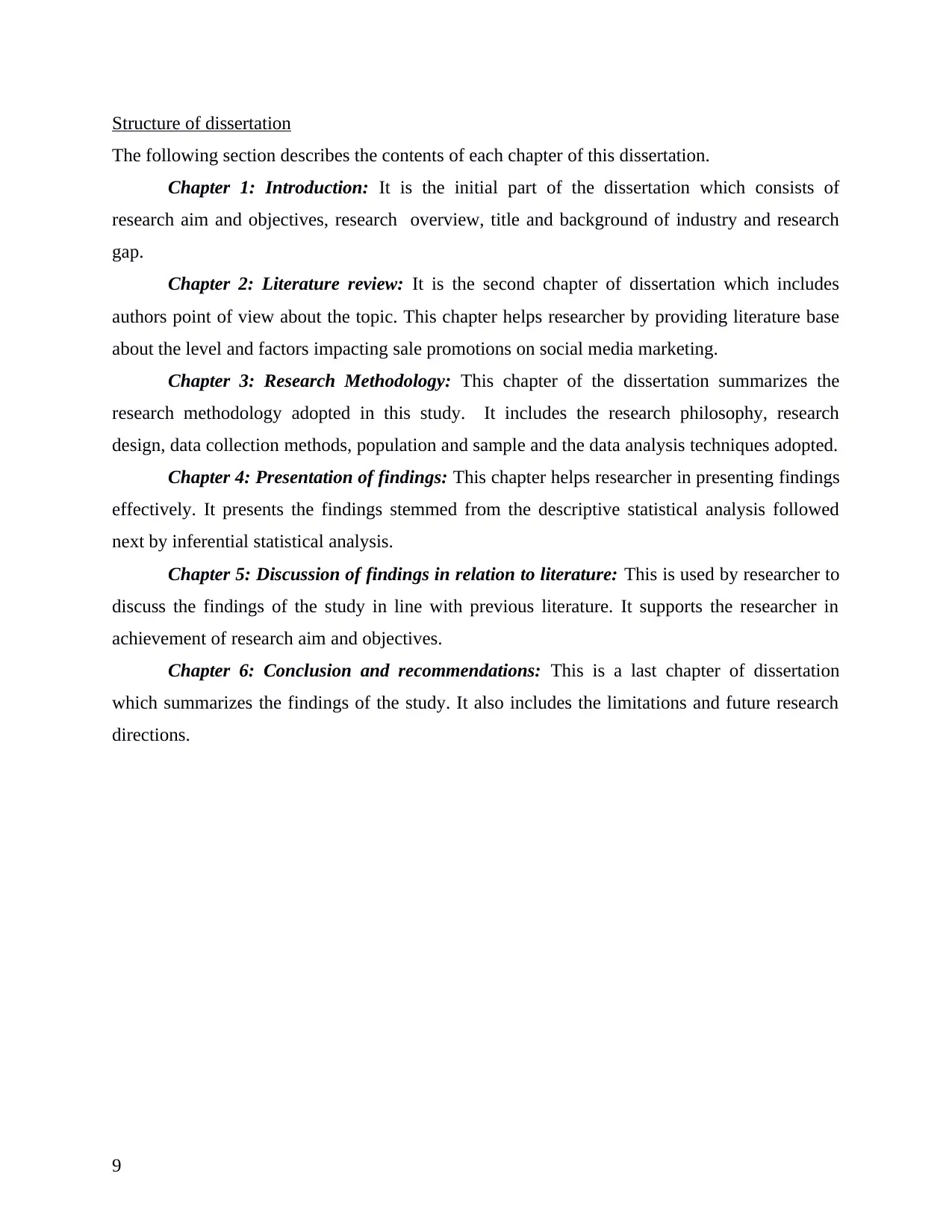
Structure of dissertation
The following section describes the contents of each chapter of this dissertation.
Chapter 1: Introduction: It is the initial part of the dissertation which consists of
research aim and objectives, research overview, title and background of industry and research
gap.
Chapter 2: Literature review: It is the second chapter of dissertation which includes
authors point of view about the topic. This chapter helps researcher by providing literature base
about the level and factors impacting sale promotions on social media marketing.
Chapter 3: Research Methodology: This chapter of the dissertation summarizes the
research methodology adopted in this study. It includes the research philosophy, research
design, data collection methods, population and sample and the data analysis techniques adopted.
Chapter 4: Presentation of findings: This chapter helps researcher in presenting findings
effectively. It presents the findings stemmed from the descriptive statistical analysis followed
next by inferential statistical analysis.
Chapter 5: Discussion of findings in relation to literature: This is used by researcher to
discuss the findings of the study in line with previous literature. It supports the researcher in
achievement of research aim and objectives.
Chapter 6: Conclusion and recommendations: This is a last chapter of dissertation
which summarizes the findings of the study. It also includes the limitations and future research
directions.
9
The following section describes the contents of each chapter of this dissertation.
Chapter 1: Introduction: It is the initial part of the dissertation which consists of
research aim and objectives, research overview, title and background of industry and research
gap.
Chapter 2: Literature review: It is the second chapter of dissertation which includes
authors point of view about the topic. This chapter helps researcher by providing literature base
about the level and factors impacting sale promotions on social media marketing.
Chapter 3: Research Methodology: This chapter of the dissertation summarizes the
research methodology adopted in this study. It includes the research philosophy, research
design, data collection methods, population and sample and the data analysis techniques adopted.
Chapter 4: Presentation of findings: This chapter helps researcher in presenting findings
effectively. It presents the findings stemmed from the descriptive statistical analysis followed
next by inferential statistical analysis.
Chapter 5: Discussion of findings in relation to literature: This is used by researcher to
discuss the findings of the study in line with previous literature. It supports the researcher in
achievement of research aim and objectives.
Chapter 6: Conclusion and recommendations: This is a last chapter of dissertation
which summarizes the findings of the study. It also includes the limitations and future research
directions.
9
⊘ This is a preview!⊘
Do you want full access?
Subscribe today to unlock all pages.

Trusted by 1+ million students worldwide
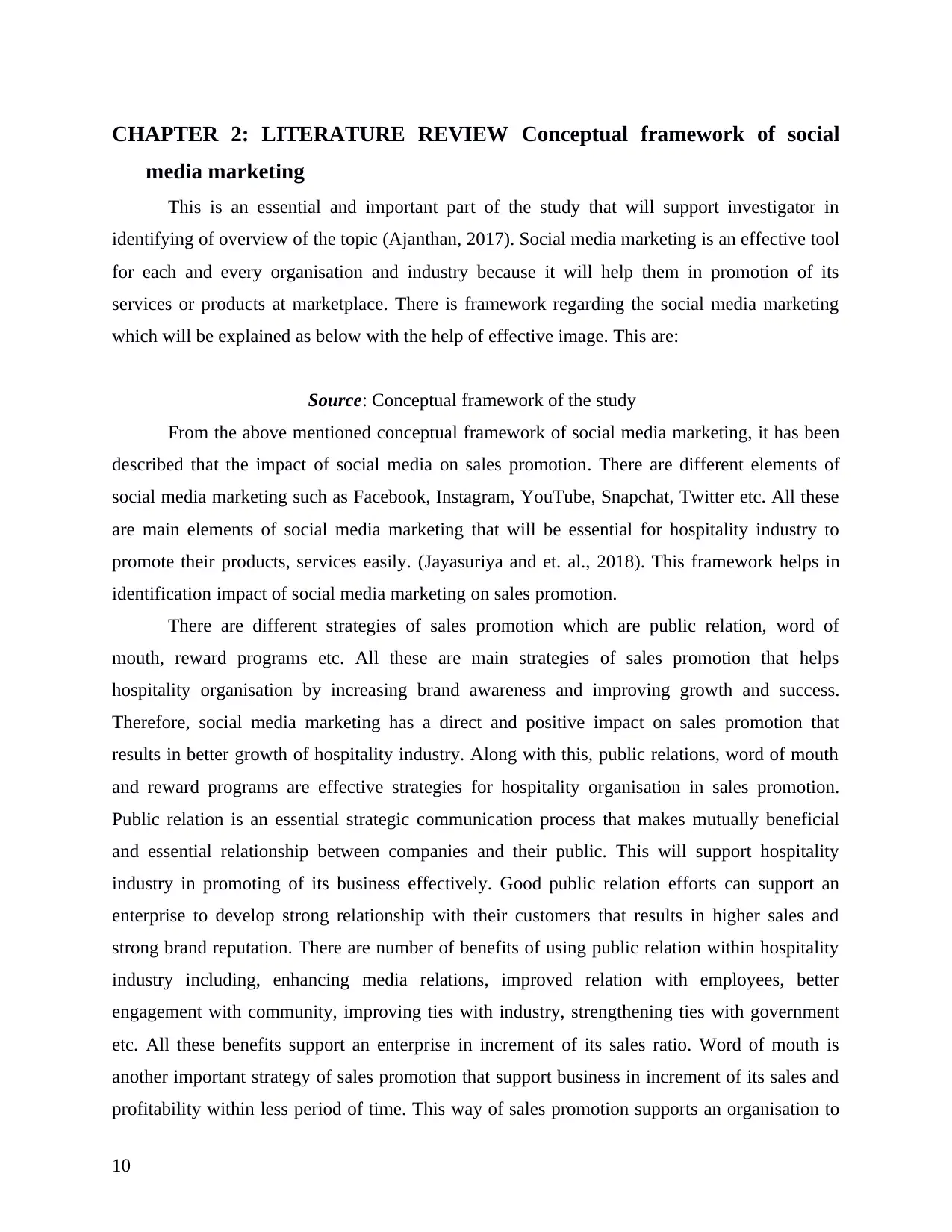
CHAPTER 2: LITERATURE REVIEW Conceptual framework of social
media marketing
This is an essential and important part of the study that will support investigator in
identifying of overview of the topic (Ajanthan, 2017). Social media marketing is an effective tool
for each and every organisation and industry because it will help them in promotion of its
services or products at marketplace. There is framework regarding the social media marketing
which will be explained as below with the help of effective image. This are:
Source: Conceptual framework of the study
From the above mentioned conceptual framework of social media marketing, it has been
described that the impact of social media on sales promotion. There are different elements of
social media marketing such as Facebook, Instagram, YouTube, Snapchat, Twitter etc. All these
are main elements of social media marketing that will be essential for hospitality industry to
promote their products, services easily. (Jayasuriya and et. al., 2018). This framework helps in
identification impact of social media marketing on sales promotion.
There are different strategies of sales promotion which are public relation, word of
mouth, reward programs etc. All these are main strategies of sales promotion that helps
hospitality organisation by increasing brand awareness and improving growth and success.
Therefore, social media marketing has a direct and positive impact on sales promotion that
results in better growth of hospitality industry. Along with this, public relations, word of mouth
and reward programs are effective strategies for hospitality organisation in sales promotion.
Public relation is an essential strategic communication process that makes mutually beneficial
and essential relationship between companies and their public. This will support hospitality
industry in promoting of its business effectively. Good public relation efforts can support an
enterprise to develop strong relationship with their customers that results in higher sales and
strong brand reputation. There are number of benefits of using public relation within hospitality
industry including, enhancing media relations, improved relation with employees, better
engagement with community, improving ties with industry, strengthening ties with government
etc. All these benefits support an enterprise in increment of its sales ratio. Word of mouth is
another important strategy of sales promotion that support business in increment of its sales and
profitability within less period of time. This way of sales promotion supports an organisation to
10
media marketing
This is an essential and important part of the study that will support investigator in
identifying of overview of the topic (Ajanthan, 2017). Social media marketing is an effective tool
for each and every organisation and industry because it will help them in promotion of its
services or products at marketplace. There is framework regarding the social media marketing
which will be explained as below with the help of effective image. This are:
Source: Conceptual framework of the study
From the above mentioned conceptual framework of social media marketing, it has been
described that the impact of social media on sales promotion. There are different elements of
social media marketing such as Facebook, Instagram, YouTube, Snapchat, Twitter etc. All these
are main elements of social media marketing that will be essential for hospitality industry to
promote their products, services easily. (Jayasuriya and et. al., 2018). This framework helps in
identification impact of social media marketing on sales promotion.
There are different strategies of sales promotion which are public relation, word of
mouth, reward programs etc. All these are main strategies of sales promotion that helps
hospitality organisation by increasing brand awareness and improving growth and success.
Therefore, social media marketing has a direct and positive impact on sales promotion that
results in better growth of hospitality industry. Along with this, public relations, word of mouth
and reward programs are effective strategies for hospitality organisation in sales promotion.
Public relation is an essential strategic communication process that makes mutually beneficial
and essential relationship between companies and their public. This will support hospitality
industry in promoting of its business effectively. Good public relation efforts can support an
enterprise to develop strong relationship with their customers that results in higher sales and
strong brand reputation. There are number of benefits of using public relation within hospitality
industry including, enhancing media relations, improved relation with employees, better
engagement with community, improving ties with industry, strengthening ties with government
etc. All these benefits support an enterprise in increment of its sales ratio. Word of mouth is
another important strategy of sales promotion that support business in increment of its sales and
profitability within less period of time. This way of sales promotion supports an organisation to
10
Paraphrase This Document
Need a fresh take? Get an instant paraphrase of this document with our AI Paraphraser
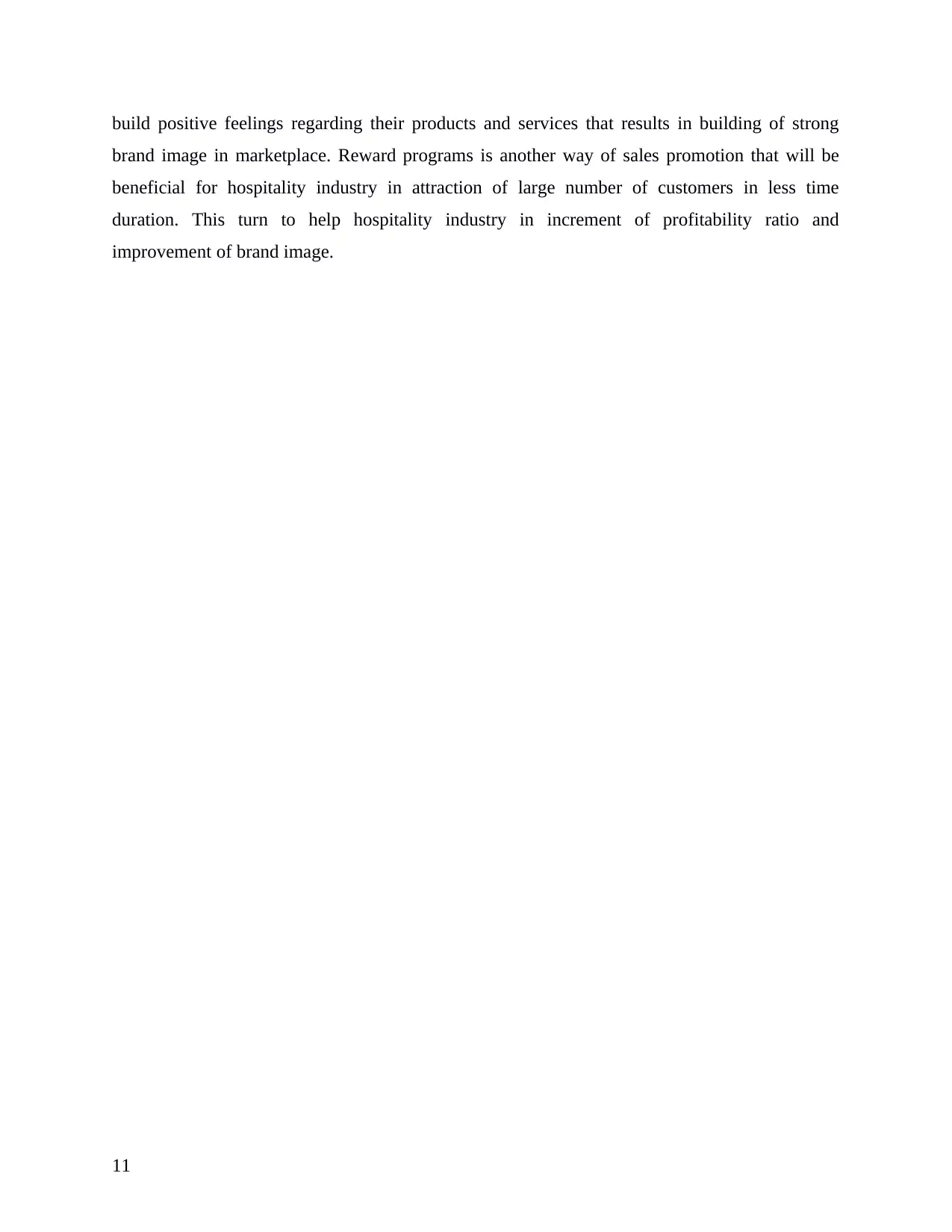
build positive feelings regarding their products and services that results in building of strong
brand image in marketplace. Reward programs is another way of sales promotion that will be
beneficial for hospitality industry in attraction of large number of customers in less time
duration. This turn to help hospitality industry in increment of profitability ratio and
improvement of brand image.
11
brand image in marketplace. Reward programs is another way of sales promotion that will be
beneficial for hospitality industry in attraction of large number of customers in less time
duration. This turn to help hospitality industry in increment of profitability ratio and
improvement of brand image.
11
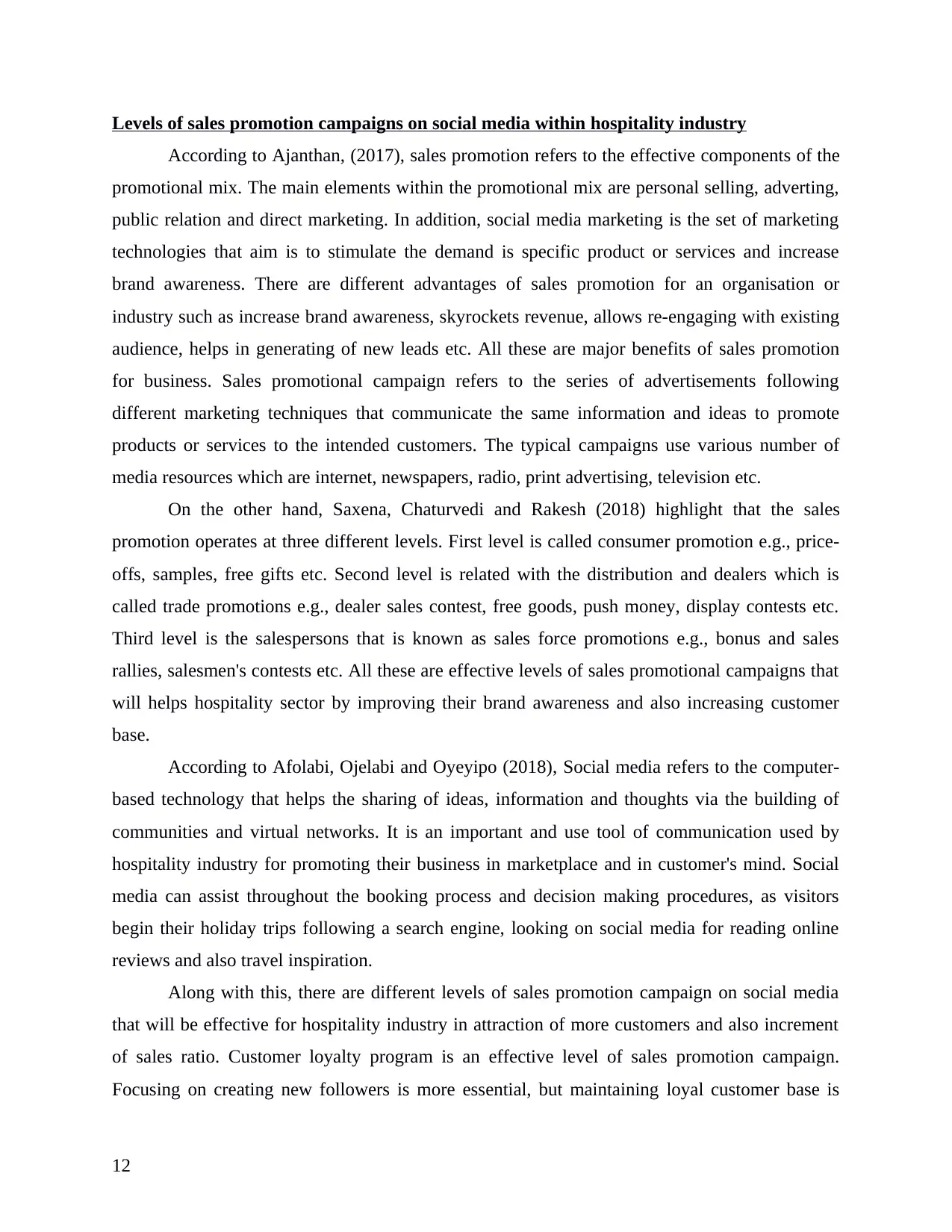
Levels of sales promotion campaigns on social media within hospitality industry
According to Ajanthan, (2017), sales promotion refers to the effective components of the
promotional mix. The main elements within the promotional mix are personal selling, adverting,
public relation and direct marketing. In addition, social media marketing is the set of marketing
technologies that aim is to stimulate the demand is specific product or services and increase
brand awareness. There are different advantages of sales promotion for an organisation or
industry such as increase brand awareness, skyrockets revenue, allows re-engaging with existing
audience, helps in generating of new leads etc. All these are major benefits of sales promotion
for business. Sales promotional campaign refers to the series of advertisements following
different marketing techniques that communicate the same information and ideas to promote
products or services to the intended customers. The typical campaigns use various number of
media resources which are internet, newspapers, radio, print advertising, television etc.
On the other hand, Saxena, Chaturvedi and Rakesh (2018) highlight that the sales
promotion operates at three different levels. First level is called consumer promotion e.g., price-
offs, samples, free gifts etc. Second level is related with the distribution and dealers which is
called trade promotions e.g., dealer sales contest, free goods, push money, display contests etc.
Third level is the salespersons that is known as sales force promotions e.g., bonus and sales
rallies, salesmen's contests etc. All these are effective levels of sales promotional campaigns that
will helps hospitality sector by improving their brand awareness and also increasing customer
base.
According to Afolabi, Ojelabi and Oyeyipo (2018), Social media refers to the computer-
based technology that helps the sharing of ideas, information and thoughts via the building of
communities and virtual networks. It is an important and use tool of communication used by
hospitality industry for promoting their business in marketplace and in customer's mind. Social
media can assist throughout the booking process and decision making procedures, as visitors
begin their holiday trips following a search engine, looking on social media for reading online
reviews and also travel inspiration.
Along with this, there are different levels of sales promotion campaign on social media
that will be effective for hospitality industry in attraction of more customers and also increment
of sales ratio. Customer loyalty program is an effective level of sales promotion campaign.
Focusing on creating new followers is more essential, but maintaining loyal customer base is
12
According to Ajanthan, (2017), sales promotion refers to the effective components of the
promotional mix. The main elements within the promotional mix are personal selling, adverting,
public relation and direct marketing. In addition, social media marketing is the set of marketing
technologies that aim is to stimulate the demand is specific product or services and increase
brand awareness. There are different advantages of sales promotion for an organisation or
industry such as increase brand awareness, skyrockets revenue, allows re-engaging with existing
audience, helps in generating of new leads etc. All these are major benefits of sales promotion
for business. Sales promotional campaign refers to the series of advertisements following
different marketing techniques that communicate the same information and ideas to promote
products or services to the intended customers. The typical campaigns use various number of
media resources which are internet, newspapers, radio, print advertising, television etc.
On the other hand, Saxena, Chaturvedi and Rakesh (2018) highlight that the sales
promotion operates at three different levels. First level is called consumer promotion e.g., price-
offs, samples, free gifts etc. Second level is related with the distribution and dealers which is
called trade promotions e.g., dealer sales contest, free goods, push money, display contests etc.
Third level is the salespersons that is known as sales force promotions e.g., bonus and sales
rallies, salesmen's contests etc. All these are effective levels of sales promotional campaigns that
will helps hospitality sector by improving their brand awareness and also increasing customer
base.
According to Afolabi, Ojelabi and Oyeyipo (2018), Social media refers to the computer-
based technology that helps the sharing of ideas, information and thoughts via the building of
communities and virtual networks. It is an important and use tool of communication used by
hospitality industry for promoting their business in marketplace and in customer's mind. Social
media can assist throughout the booking process and decision making procedures, as visitors
begin their holiday trips following a search engine, looking on social media for reading online
reviews and also travel inspiration.
Along with this, there are different levels of sales promotion campaign on social media
that will be effective for hospitality industry in attraction of more customers and also increment
of sales ratio. Customer loyalty program is an effective level of sales promotion campaign.
Focusing on creating new followers is more essential, but maintaining loyal customer base is
12
⊘ This is a preview!⊘
Do you want full access?
Subscribe today to unlock all pages.

Trusted by 1+ million students worldwide
1 out of 57
Related Documents
Your All-in-One AI-Powered Toolkit for Academic Success.
+13062052269
info@desklib.com
Available 24*7 on WhatsApp / Email
![[object Object]](/_next/static/media/star-bottom.7253800d.svg)
Unlock your academic potential
Copyright © 2020–2026 A2Z Services. All Rights Reserved. Developed and managed by ZUCOL.





